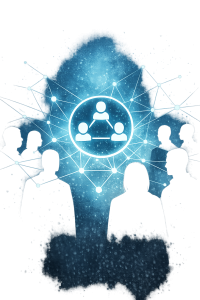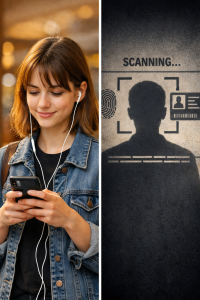I find myself quite often discussing the issue of “doom scrolling”, an increasing addiction which is not getting much coverage outside of lectures on mental health and neuroscience.
Instagram, Facebook and similar “me me” social media platforms can be challenging for us all for several reasons. While they offer potentially positive aspects like connection and creativity, the design and usage patterns can negatively affect mental health, especially for people prone to anxiety, depression, or self-esteem struggles. Some key reasons include:
1. Social Comparison
- Curated and Unrealistic Content: They often presents highly curated, idealized versions of people’s lives. Seeing others’ “highlight reels” of success, beauty, travel, or relationships can make users compare their own lives unfavorably, leading to feelings of inadequacy, jealousy, or lower self-esteem. This is not healthy for anyone!
- Body Image Issues: Frequent exposure to images of “perfect” bodies, filtered selfies, and beauty standards can worsen body dissatisfaction, particularly in those who already struggle with body image or eating disorders. Do you honestly want to start feeling like you’re not body perfect compared to the many 18 year olds that avidly share their pics?
2. Fear of Missing Out (FOMO)
- Constant Updates: Seeing friends or influencers attending events, traveling, or achieving milestones can evoke a sense of missing out, which can heighten feelings of loneliness, anxiety, and depression. Why wasn’t I invited or I am not worthy because I can’t afford to have a holiday abroad – this is what people end up feeling…
- Pressure to Participate: Users may feel pressured to constantly be online or post updates to “keep up” with others, which can lead to stress and a fear of being left out or forgotten. Who actually sees your posts in any case, in a controlled space where algorythms determine what people are shown.
3. Addiction and Overuse
- Dopamine Hits: They are designed to be addictive, with features like “likes,” comments, and follower counts that trigger dopamine responses in the brain. For people with mental health issues, this can create a cycle of seeking validation and approval, leading to compulsive checking of the app. This is something I have raised in previous posts
- Disrupted Sleep and Focus: Overuse of these platforms, especially before bed, can lead to poor sleep hygiene, insomnia, and difficulty focusing on daily tasks, which can exacerbate symptoms of depression and anxiety. Remember old fashioned books (no, not the kindle, unless you’re going to turn on the audio function), I used to pick up a book in bed and be nodding off within about ten minutes.
4. Cyberbullying and Online Harassment
- Negative Interactions: I’ve lost count of the number of scammers, sellers and low hanging fruit who have messaged me online… Some can be quite aggressive and try to get you to part with your money for that “business tip” that will help you income double each month. People with mental health issues may be particularly vulnerable to online bullying, negative comments, or trolling. Such interactions can amplify feelings of worthlessness, shame, or anxiety or end up costing you a lot of money.
- Anonymous Criticism: They can provide a platform for anonymous harassment, which can make it difficult for vulnerable users to escape toxic interactions. Again, I have highlighted this issue before in connection with ignoring comments from people with whom you have no connection.
5. Validation-Seeking Behavior
- External Approval: People may rely on social for external validation through likes, comments, and followers. For those with low self-esteem, not receiving enough “likes” or positive feedback can lead to heightened insecurity, anxiety, and a sense of failure. Going back to building your own self esteem through things you do in real life allows you to grow.
- Fragile Self-Worth: Constantly seeking approval online can lead to a fragile sense of self-worth that depends on social media feedback, making emotional well-being vulnerable to fluctuations in engagement.
6. Influence of Harmful Content
- Promotion of Unhealthy Ideals: Some content promotes unrealistic beauty standards, extreme dieting, or materialism. For people already struggling with mental health issues, this can reinforce harmful behaviors, like disordered eating or excessive spending.
- Triggering Content: Even with content warnings, posts related to self-harm, suicide, or other sensitive topics can trigger negative emotions or reinforce unhealthy thoughts in individuals who are already vulnerable.
7. Perfectionism and Performance Pressure
- Pressure to Appear Perfect: They can create an environment where users feel pressure to post polished, aesthetically pleasing, and “perfect” content. This perfectionism can lead to stress and anxiety, especially for those prone to self-criticism. Stop comparing your partner to the airbrushed “influencers”; lads, do you really think that Instaslut has any interest in you other than getting you to take a subcription to her online OF channel?
- Fear of Judgement: Some individuals with mental health issues may feel overly concerned with how they are perceived on social media, leading to heightened anxiety and self-doubt. I’ve recognised this in someone I care about; the regular comments about whether I liked a photo they sent me… yes you are much more than some randomer!
8. Reduced Real-Life Interaction
- Isolation: Excessive social media use (even if just scrolling through) can reduce time spent on managing your business, real-life social interactions and meaningful relationships. This can increase feelings of loneliness and isolation, especially for people who are already struggling with mental health.
- Detachment from Reality: Spending too much time on social media can also create a sense of detachment from reality, fostering a disconnect between one’s real life and the idealized versions of life seen online. It’s like becoming a Stepford Wife…
9. Neglect of Mental Health Care
- Procrastination and Avoidance: People may turn to social media as a distraction or coping mechanism, avoiding real-world issues or neglecting their mental health needs. If this is just a temporary thing, then it’s not an issue, but one week of scrolling can turn into two and suddenly you’re in a position where you are grabbing your mobile each morning to check on what’s new rather than getting on with what you need in your life.
Conclusion:
These concerns affects us all and for some people, the constant need to check social media is becoming an addiction which concerns me greatly.
For people with mental health challenges, use of social media promotes comparison, perfectionism, and this social validation can worsen symptoms of anxiety, depression, and low self-esteem. While it can be used in healthy and very moderate ways, it’s important for individuals prone to mental health issues to be mindful of their social media use, set very high boundaries, and consider detox periods or seeking support when needed.
For some of you, the easiest thing would be to go “cold turkey”; set yourself a target to delete one app each week for example, starting by the one with the least value to you as an individual. If your business or work requires you to post on social media, only use an account which others use as this will stop you from “personalisisng” the account and allowing you to revert to old habits.



